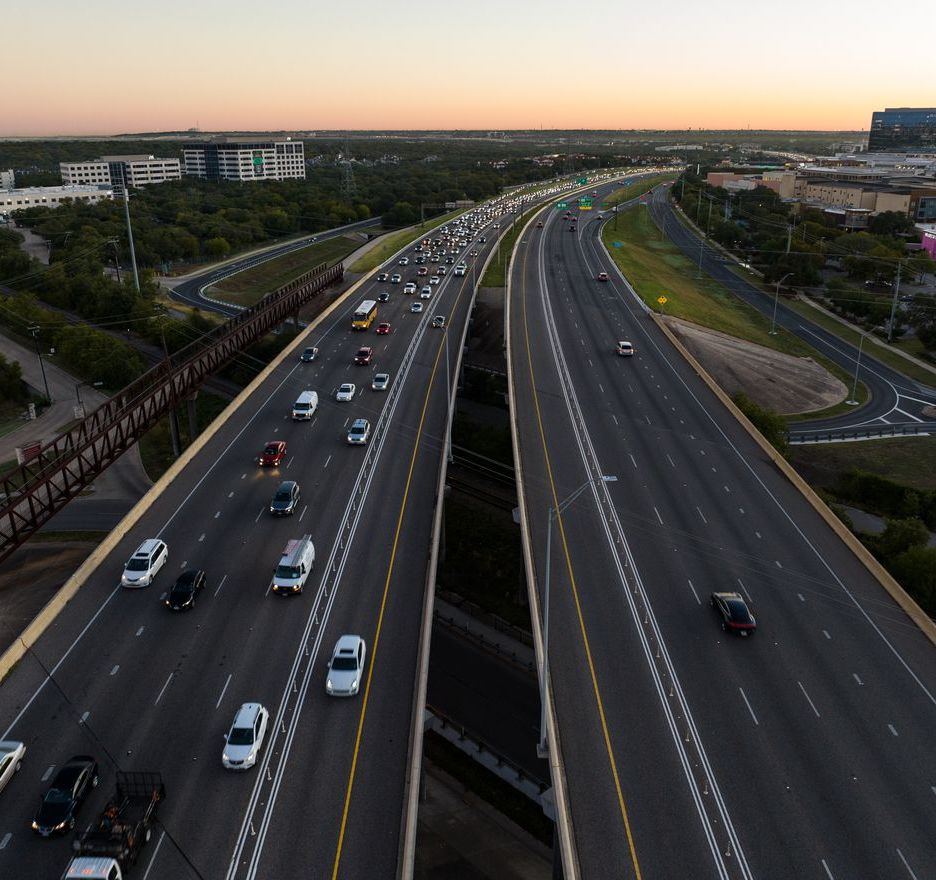
Eminent Domain and Texas Highway Expansion Takings
Eminent domain in Texas is the legal authority that enables the government to acquire private property for public use, even if the owner doesn’t wish to sell. Eminent domain is often exercised for public infrastructure projects, such as highway construction, road widening, and railroad crossings, where land acquisition is required to improve transportation networks, enhance safety, and increase connectivity.
Authority for Eminent Domain
The authority for eminent domain comes from both the U.S. Constitution and the Texas Constitution. The Fifth Amendment to the U.S. Constitution guarantees that private property shall not be taken for public use without just compensation, a principle mirrored in Article I, Section 17 of the Texas Constitution. This ensures that a property owner is financially compensated at fair market value when their land is acquired for public use or development projects.
Key Stakeholders
Key stakeholders in eminent domain for highway projects in Texas include the Texas Department of Transportation (TxDOT), which oversees most state highway expansions, as well as municipalities and certain authorized private entities, such as utility companies and railroad operators. These entities have the legal authority to initiate condemnation proceedings to acquire property necessary for public infrastructure.
Know Your Legal Rights – Contact Vestige Law
Eminent domain cases often involve complex legal and financial issues, including the valuation of land, damages to remaining property, and procedural compliance. Thus, property owners are strongly advised to seek the assistance of an experienced eminent domain attorney. Vestige Law will help ensure that you receive just compensation, and that your rights are protected during the eminent domain process.
The Eminent Domain Process for Road and Highway Projects
The Texas eminent domain process starts when a government agency, such as TxDOT, identifies private property that is needed for a highway or road project. Texas landowners are formally notified of the planned project and informed that their land may be required for the project. This notification marks the first official step in the process, providing landowners with the opportunity to understand the project’s scope and prepare for negotiations.
Government Conducts Appraisal
After appraisal, notification, the government conducts an appraisal to determine the fair market value of the property. Based on this appraisal, the condemning authority makes a bona fide offer to purchase the land.
Property owners are not obligated to accept the initial offer and are encouraged to obtain independent appraisals to challenge the government’s valuation if it appears insufficient. The bona fide offer is a critical step designed to encourage voluntary acquisition before initiating formal legal proceedings.
Condemnation Petition
If the property owner rejects the state’s offer, the condemning authority may file a condemnation petition in the appropriate county court. Once the petition is filed, the court appoints three special commissioners, who are local landowners experienced in property valuation.
These commissioners hold a hearing to determine the amount of just compensation owed, considering both the land taken and any damages to the remaining property in cases of partial takings. The property owner has the right to present evidence, hire expert appraisers, and contest the government’s valuation during this hearing.
Property Owner May Negotiate or Litigate
The private property owner also retain the right to dispute the taking or challenge the compensation through negotiation or litigation. If they disagree with the commissioners’ award, they can appeal to a court and potentially have a jury decide the final amount.
An eminent domain attorney or utility easement lawyer plays a crucial role in protecting landowners from unfavorable easement terms or undervalued compensation. Experienced attorneys from Vestige Law guide property owners through negotiations, ensure procedural compliance, and advocate for maximum recovery for both the land taken and the impact on the remainder of the property.
Impacts of Highway and Road Expansion on Property Owners
Highway and road expansion projects can have significant physical and economic impacts on property owners. One of the most immediate consequences is partial or total land loss, which directly affects property size and value.
Even when only a portion of the land is taken, the remaining parcel may be less functional or more difficult to develop, resulting in reduced usability. Driveways, access roads, or other key features may be removed or altered, changing the way owners can use their property.
Residential Relocation or Business Loss
The physical loss of land is not the only potential consequence of a public road project. Highway projects can lead to business disruption or residential relocation. Commercial properties may experience decreased customer access, while homeowners may face increased noise, traffic, or safety hazards.
In some cases, owners may be forced to relocate entirely, resulting in additional financial and logistical burdens. These disruptions can extend the impact of eminent domain well beyond the land actually taken, affecting both the operation and value of the remaining property.
Permanent Easements
Eminent domain road widening often involves additional legal considerations, such as the establishment of permanent easements. Easements allow the government or utility companies ongoing access to portions of the property. Proximity to heavy traffic can create long-term nuisances, including noise, vibration, or safety concerns, that reduce property value.
Railroad crossing projects add another layer of complexity, introducing safety, regulatory, and access challenges that may require specialized legal or engineering expertise to navigate.
Property Owners Must Document Impacts
Property owners are strongly encouraged to document all impacts carefully. Photographs, access diagrams, traffic studies, and records of business operations can show your losses or disruptions to property. Proper documentation is crucial during appraisal and valuation discussions. It provides concrete evidence to support claims for compensation, including damages to the remaining property.
By understanding the potential impacts and preparing early, landowners can better protect their rights and ensure they receive just compensation under Texas law for both the land taken and any lasting effects of a highway or road expansion project.
Property Valuation, Compensation, and Relocation
If you are a property owner affected by highway or road expansion, you’re entitled to just compensation under both the Texas and U.S. Constitutions. Just compensation is intended to place the property owner in the same financial position they would have been in had the property not been taken.
It typically includes the fair market value of the land acquired, as well as severance damages for any reduction in value to the remaining property and lost business income if the project disrupts commercial operations.
Relocation Assistance
Relocation assistance may be provided for homeowners and business owners who must move due to the project, covering moving costs and certain replacement expenses. Property owners may also receive compensation for loss of access or diminished business use, such as when driveways are removed or customer traffic is reduced.
Furthermore, if the remainder of the property suffers a loss in value due to noise, traffic, or altered accessibility, these impact damages are also considered part of just compensation.
Hire A Lawyer Before Accepting an Initial Offer
Property owners are strongly advised not to accept the state’s initial offer without consulting a lawyer skilled in eminent domain law. Early offers may significantly underestimate the true market impact of the project, particularly in cases of partial takings, severance damages, or business disruption.
An experienced eminent domain attorney at Vestige Law can review appraisals, challenge undervalued offers, document property impacts, and negotiate or litigate to ensure the landowner receives the full compensation to which they are entitled.
By understanding how compensation is calculated and preparing to assert all rights, property owners can protect their financial interests and ensure that both the land taken and the lasting impacts of the highway expansion are fairly addressed under Texas law.
Legal Protections and the Role of a Highway Eminent Domain Attorney
A highway eminent domain law attorney is an essential ally for property owners facing land acquisition for road or highway projects by the state or federal government. Their primary role is to protect your legal rights and ensure you receive just compensation.
Reviewing Government Property Appraisals
One key responsibility is reviewing government appraisals to determine whether the state’s valuation accurately reflects the fair market value of your property. Attorneys often engage qualified independent appraisers to challenge low offers and document damages to the remainder of your property in partial takings.
Utility Easement Lawyer May Be Critical
For projects involving utilities, such as electric lines, water mains, or communication infrastructure, a utility easement lawyer may be necessary. These attorneys can review and negotiate easement terms, limit long-term impacts, and ensure that access rights do not unduly restrict the owner’s remaining property. Proper legal representation can reduce future nuisance, maintain property usability, and protect the owner from overly broad easement obligations.

What Landowners Should Do Next: Protecting Your Rights
An eminent domain attorney for highways plays a critical role in protecting property owners’ rights during Texas road and highway expansion projects. One of their primary responsibilities is to review government appraisals, ensuring that the initial valuation of the property is accurate and fair.
They can identify errors, omissions, or undervaluations that might otherwise result in an insufficient offer. Attorneys often engage qualified independent appraisers on behalf of the landowner to prepare a countervaluation that supports higher compensation for both the land taken and any damages to the remainder.
Guidance for Negotiations and Litigation
Beyond appraisals, attorneys guide landowners through negotiations or litigation. They advocate for just compensation, present evidence to special commissioners or courts, and ensure that procedural requirements are properly followed.
Experienced attorneys can also help landowners oppose takings that may not meet the public use standard, including instances where eminent domain is misapplied for zoning purposes rather than genuine highway needs, a practice sometimes referred to as “zoning eminent domain.”
Follow These Eminent Domain Tips Closely
Action steps for an eminent domain case that your attorney may recommend are:
- Never sign an agreement or offer without an eminent domain law attorney reviewing it first.
- Consult our Houston-based eminent domain attorney when the government contacts you about an eminent domain matter.
- Ask for a second property appraisal from an independent expert.
- Document your losses and impacts related to the eminent domain case.
By hiring a qualified Vestige Law eminent domain or utility easement attorney early in the process, you can protect your rights, increase compensation, and reduce the long-term impacts of road expansion projects.
Frequently Asked Questions
Can the government take my property for a road or highway expansion in Texas?
Yes, in Texas, the state government does have the power to take private property for public use, such as building or expanding roads and highways. This power is called eminent domain. Highway expansion clearly qualifies as a public use.
What is the eminent domain process for highway and road projects in Texas?
The eminent domain process for highway and road projects follows a structured legal framework designed to balance the government’s authority to build public infrastructure with a property owner’s constitutional rights. The process begins with the identification of land needed for a public project, such as a highway expansion, by the Texas Department of Transportation or another authorized condemning authority.
Once the property is identified, the government must make a bona fide offer to purchase it at what it determines to be fair market value, based on an independent appraisal. Property owners have the right to obtain their own appraisal to challenge the government’s valuation.
If the property owner and the government cannot reach an agreement through negotiation, the condemning authority files a petition for condemnation in the county court where the property is located. The judge then appoints three special commissioners, who are local landowners familiar with property values in the area.
The commissioners conduct a hearing, during which both the property owner and the government may present evidence and testimony regarding the property’s value and the impact of the taking. The commissioners then issue an award, which determines the amount of compensation owed to the property owner.
Do I have to accept the state’s initial offer for my land in a road expansion project?
No, you do not have to accept the state’s initial offer for your land in a Texas road expansion project. The first offer made by the Texas Department of Transportation or another condemning authority is often based on their appraisal of your property’s fair market value, but you have the right to reject it if you believe it does not represent adequate compensation.
How is “just compensation” determined for highway takings in Texas?
In Texas, “just compensation” for highway takings is generally defined as the fair market value of the property at the time of the taking, along with any damages to the remainder of the property if only part of the land is acquired. The goal is to put the property owner in as good a financial position as if the taking had never happened.
Can I fight a condemnation for road expansion in Texas?
You can fight a condemnation for road expansion in Texas, but the scope of what you can challenge is limited. Under Texas law, the government has broad eminent domain authority to take private land for public use, such as roads and highways. Courts almost always uphold the “public use” requirement when it comes to transportation projects, making it very difficult to stop the taking entirely.
What are my rights as a property owner during a TxDOT expansion project in Texas?
As a property owner in Texas, you have a set of important rights when the Texas Department of Transportation (TxDOT) seeks to take your land for a road or highway expansion project through eminent domain. These rights are designed to protect you from unfair treatment and ensure you are properly compensated.
TxDOT must tell you that your property is needed for a project and provide you with a written appraisal of its fair market value. Before filing a condemnation lawsuit, they must make a “bona fide” purchase offer, which means a fair and good-faith offer based on the appraisal.
What is the difference between a partial taking and a full taking in road projects?
In Texas, the difference between a partial taking and a full taking in road and highway projects hinges on the extent of property acquisition and the method of compensation calculation. A full taking occurs when the government acquires your entire property for a project. In this case, you are entitled to the fair market value of the whole property as of the date of the taking. A partial taking happens when only a portion of your property is acquired, which is very common in road and highway expansions.
Can highway expansion reduce the value of the rest of my property?
Yes. A highway expansion can reduce the value of the rest of your property, and in Texas, that reduction is legally recognized as part of what’s called remainder damages in a partial taking.
How long do I have to respond to a notice of condemnation in Texas?
In Texas, once you receive a notice of condemnation, the timeline moves fairly quickly. Before filing a condemnation lawsuit, TxDOT (or another condemning authority) must make you a bona fide offer. By law, they must give you at least 30 days to consider and respond to their final offer before they can file the condemnation petition in court. If negotiations fail and a condemnation lawsuit is filed in county court, you will be formally served with the petition. At that point, Texas law generally gives you until the Monday following 20 days after you’re served to file this answer.
What if the highway expansion causes drainage, noise, or access issues on my remaining land?
If a highway expansion causes drainage problems, noise, or access issues on the part of your property that remains after a partial taking, Texas law recognizes these impacts as damages to the remainder. In other words, you may be entitled to additional compensation beyond the value of the land actually taken.


